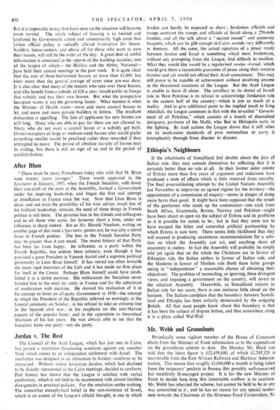Ethiopia's Neighbours
If the inhabitants of Somaliland feel doubts about the joys of Italian rule, they may console themselves by reflecting that it is certainly better than no rule at all. In their former sister colony• of Eritrea more than five years of argument and indecision have produced a state of affairs which is little removed from anarchy. The final procrastinating attempt by the United Nations Assembly last November to improvise an agreed regime for the territory—the appointment of a commission of enquiry—seems in danger of doing more harm than good. It might have been supposed that the minds of the gentlemen who made up the commission—one each from South Africa, Guatemala, Burma, Norway and Pakistan—might have been about at open on the subject of Eritrea and its problems as it is possible for minds to be ; but in fact they seem not to have escaped the bitter and somewhat artificial partisanship by which Eritrea is now torn. There seems little likelihood that they will succeed in producing unanimous recommendations for a solu- tion on which the Assembly can act, and anything short of unanimity is useless. In fact the Assembly will probably be simply told yet again that on the whole the Christians are in favour of Ethiopian rule, the Italian settlers in favour of Italian rule, and the Moslems in favour of Moslem rule (both these latter groups seeing in " independence " a reasonable chance of obtaining their objectives). The problem of reconciling, or ignoring, these divergent views, and imposing a government on the country, will revert to the reluctant Assembly. Meanwhile, as Somaliland returns to Italian rule for ten years, there is one ominous little cloud on the horizon. The Italians complain that the boundary between Somali- land and Ethiopia has been unfairly demarcated by the outgoing British. All that most people know about this boundary is that it has been the subject of dispute before, and that somewhere along it is a place called Wal-Wal?






































 Previous page
Previous page